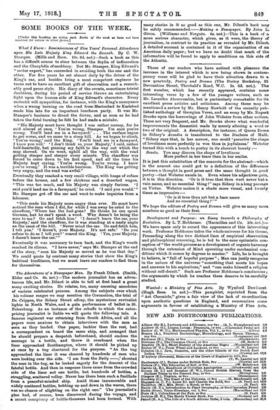SOME BOOKS OF THE WEEK.
[Under this heading we notice each Books of the week as have sot been 'curie,/ for vetute in other forms.) What I Know : Reminiscences of Five Years' Personal Attendance upon His Late Majesty King Edward the Seventh. By C. W. Stamper. (Mills and Boon. lOs. 6d. net.)—Such a book as this has a difficult course to steer between the Scylla of indiscretion and the Charybdis of snobbery. But Mr. Stamper, King Edward's " motor expert," has succeeded in avoiding both the one and the other. For five years he sat almost daily by the driver of the King's car, and besides being a most competent engineer he turns out to have an excellent gift of observation and a remark- ably good prose style. His diary of the events, sometimes trivial doubtless, during his period of service throws an entertaining light upon the human side of King Edward's character. Every motorist will sympathize, for instance, with the King's annoyance when a wrong turning on the road from Marienbad to Karisbad made him late for an important luncheon party. It was Mr. Stamper's business to direct the driver, and as soon as he had taken the fatal turning he felt he had made a mistake.
" His Majesty must have thought I was rather uneasy, for ho said almost at once, You're wrong, Stamper. I'm sure you're wrong. You'll land me in a farmyard.' . . . The surface began to get worse, and we came to a steep hill. As we began to climb, You're wrong,' said the King. 'You'll land me in a farmyard, I know you will." I don't think so, your Majesty,' I said, rather half-heartedly, but pinning my faith to the way out which the map showed. On we went, uphill all the way, with the road getting steeper and steeper every minute. The chauffeur was forced to come down to his first speed, and all the time his Majesty kept crying, You're wrong. You're wrong. I know you're wrong.' It was a terrible business. The King was getting very angry, and the road was awful."
Eventually they reached a very small village, with heaps of refuse before the houses, and a few chickens and a deserted wagon. "This -was too much, and his Majesty was simply furious.
said you'd land me in a farmyard,' he cried. said you would.'" Mr. Stamper got off the car and went to make inquiries from a labourer.
"This made his Majesty more angry than ever. He must have noticed the man when I did, for while I was away he cried to the chauffeur, ' Where has the fool gone ? He thinks he can speak German, but ho can't speak a word. Why doesn't he bring the man to me ? Go and fetch him.' I daren't leave the car, your Majesty,' said the chauffeur, for it was standing at a nasty angle on the crest of the hill. 'Never mind the car. Go and fetch him, I tell you.' I daren't, your Majesty. It's not safe.' Do you refuse to do as I tell you?' roared the King. Yes, your Majesty. I daren't leave the car.'" Eventually it was necessary to turn back, and the King's wrath reached its climax. "I have never," says Mr. Stamper at the end of the story, "seen his Majesty so moved as he was that day." We could quote by contrast many stories that show the King's habitual kindliness, but we must leave our readers to find them for themselves.










































 Previous page
Previous page